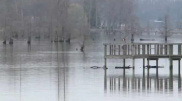Lawsuit Challenges Obama Admin Approval Of More Gulf Of Mexico Drilling
The Gulf of Mexico seems to be entering a renaissance period of fossil fuel reinvestment. Over the past month, Noble Energy, Exxon Mobil, and Shell have all announced significant finds in a region once considered as nearing peak production.
However, advocates of the Gulf have decided enough is enough and are pursuing legal action by making an example out one drilling plan in particular -- Shell's.
This new surge of discoveries could be linked to the lift on last year's drilling moratorium. Although it was lifted in October, the government issued its first post-ban permit in February. Since then, at least 88 well permits have been approved. Eight of those permits are approvals for brand new wells.
When Shell President Marvin Odum announced his company's big find, he also stated how happy he is that the approval process is up and running again, telling Reuters:
"It's good to have that system moving again, that process moving. We really need to see that machine pick up speed again."
Environmental law firm Earthjustice disagrees. So do the Defenders of Wildlife, Center for Biological Diversity, Natural Resources Defense Council, Gulf Restoration Network, Florida Wildlife Federation and the Sierra Club.
In two separate claims, the environmental groups have attacked President Obama's administration regarding their drilling approval, specifically citing Shell's plan as grossly inaccurate and irresponsible.
"It is as if the government regulators have learned nothing from the BP disaster," Earthjustice attorney David Guest said in a statement.
Instead of suing Shell directly, the group filed against the federal government. Because of the multiple plans that have been approved since the moratorium, they decided to use Shell's plan as an example of what the government approves.
David Pettit, lawyer for the Natural Resources Defense Council, told the Houston Chronicle:
"We've looked at each of these approvals and have been waiting for a case that best exemplifies what's wrong with the current process -- a test case, if you will."
Among their grievances, the groups claim that Shell plans on using the same type of blowout preventer used by BP. The organizations also say that Shell's risk calculations are based on factors irrelevant to its future drilling site.
Pointing to a statistic that appeared in Shell's drilling plan, Guest went on to say:
"No reasonable person would take a 1-in-43 chance of their house burning down, so why in heaven's name would the federal government take a 1-in-43 chance of having another massive oil spill in the Gulf of Mexico?"
Shell, however, maintains its stance, saying that the lawsuit ignores the "comprehensive nature of the approved exploration plan" and plans to work with government administration officials in the defense of their strategy.
Although the company's claimed additional regulatory oversight -- which could increase drilling costs by 10 to 20 percent -- is still being developed, the company is eager to get in there and drill. In his most recent interview with Reuters, Odum expressed his excitement over the prospect of another 15 billion barrels of oil that may lay underneath the Gulf. He explained his company's further plans:
"We're anxious to get more wells there, and we're now on the way. We'll continue to fill in with wells to keep it at maximum capacity as long as possible. We'll be drilling for years out there to fit the facility."





